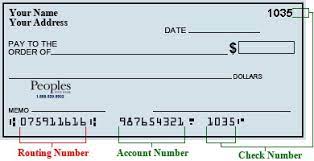Protecting private financial information

It’s common sense that government must protect the public’s financial information. When people write checks to pay fees or taxes, government must exercise care to not release private bank account numbers (AKA “Confidential Personal Identifiers”). These days, the possibility of identity theft or financial loss is very real.
A legal requirement
It’s also a legal requirement that the government protect financial account information. For example, the Open Pubic Records Act requires the protection of private financial information. New Jersey Court rules require the redaction of the last four digits of an active bank account’s routing number.
Routine procedures for protecting private information
The internal procedures to protect these records should be routine and straightforward. Copies of private checks shouldn’t be released at all, unless absolutely necessary. If they are released, the account numbers and any other personal identifying information should be redacted.
September 26, 2022, township meeting agenda
In the agenda of the September 26, 2022 meeting, Tabernacle Township Administrator and Clerk Mary Alice Brown published copies of four checks but didn’t redact bank account numbers or any other personal identifying information. Township staff uploaded the agenda packet to the website on September 22, in advance of the meeting.
The publication of the un-redacted bank account numbers violated all basic protective procedures.
Removal of checks on the township website
I brought this issue up at the September 26, public meeting. I suggested that Clerk Brown remove the checks from the township’s website. Clerk Brown disputed this and said that she redacted the checks.
Perhaps, she redacted the checks in some parallel Tabernacle universe. The Township’s website shows the un-redacted bank account numbers on the checks. Clerk Brown redacted telephone numbers associated with an application form. But telephone numbers are different from bank account numbers.
After the meeting, I sent an email to Township Administrator and Clerk Mary Alice Brown and the township committee, again, pointing out the problem. I haven’t received a response.
The un-redacted checks are still on the township website
I won’t republish those checks on TTJ. But I can tell you that, as of this POST, all of the information on the checks is as clear as day and there are no redactions. I hope this POST will motivate the committee and staff to protect that sensitive information.
The protection of active personal financial information requires extra care. Mistakes like this shouldn’t happen. But if they happen, they should be corrected immediately without suggesting that the messenger is wrong or lying.
Questions about Tabernacle’s procedures
This incident raises questions about Tabernacle’s procedures.
Question One
Why were the checks included in the online agenda packet to begin with? Administrator and Clerk Mary Alice Brown isn’t required to put checks on the township website. They should be directly deposited in the township’s bank accounts and not displayed on the internet.
Question Two
Why didn’t Township Administrator and Clerk Brown redact the active bank account numbers? Clerk Brown should know this by now. She’s been a registered municipal clerk for years and attended numerous New Jersey League of Municipalities and New Jersey Clerks’ Association seminars where they discuss issues of privacy and the redaction of public records.
Her annual salary of $132,000 is based on her knowing these basics.
Question Three
Why didn’t the township committee address the problem? The township committee has an obligation to ensure that township policies and procedures protect personal financial information. If any committee member looked at their agenda packet they would’ve seen the un-redacted checks. They should’ve looked into how this happened and made sure that they took corrective measures.
Even if committee members hadn’t noticed that copies of the un-redacted checks were in their agenda packets, which I suspect is likely, at least one committee member should’ve had the common sense to assure the public that it was concerned about the issue. A statement like this was called for but never said.
Tabernacle takes the protection of personal information seriously. We will look into it. If we find that the personal information isn’t appropriately protected, we will have the checks removed from the website or properly redacted.
From their silence, it was clear that the committee didn’t think the safeguarding of personal financial information was part of their job. Would committee members and staff want their bank account information on the web?
Yet committee members made it part of their job to give themselves a $2,500 annual raise from $5,000 to $7,500 at the September meeting!
Question Four
How come Township Attorney William Burns didn’t instruct the clerk and committee to remove the checks? As the township attorney he should know the laws that govern a township’s duty to protect personal financial information. It’s basic municipal law practice.
But Attorney Burns also said nothing. Obviously, he hasn’t looked further into the issue because he hasn’t noticed that the un-redacted checks are still on the township website. Would Attorney Burns want his bank account information on the web?
Tabernacle doesn’t take its responsibilities seriously
The fact is that Tabernacle doesn’t take its responsibilities seriously. This isn’t the first time Tabernacle has published personal bank account information. During the fire district’s heated debate, the Township Clerk La Shawn Barber, clearly with the blessings of the committee and township attorney, published a check with all of its personal identifiers. The check belonged to the fire district secretary.
Tabernacle Township must be vigilant about protecting personal financial information. Township employees must do their job carefully and responsibly. And township committee must provide the oversight to make sure that this happens.